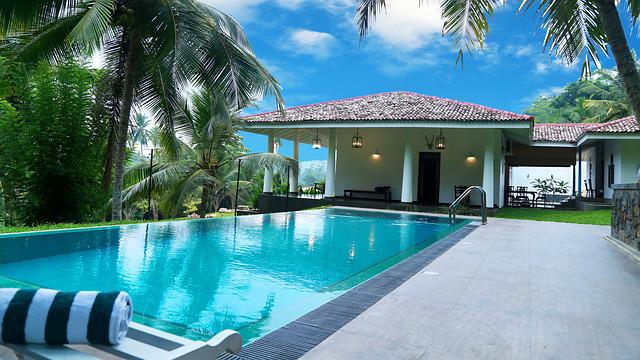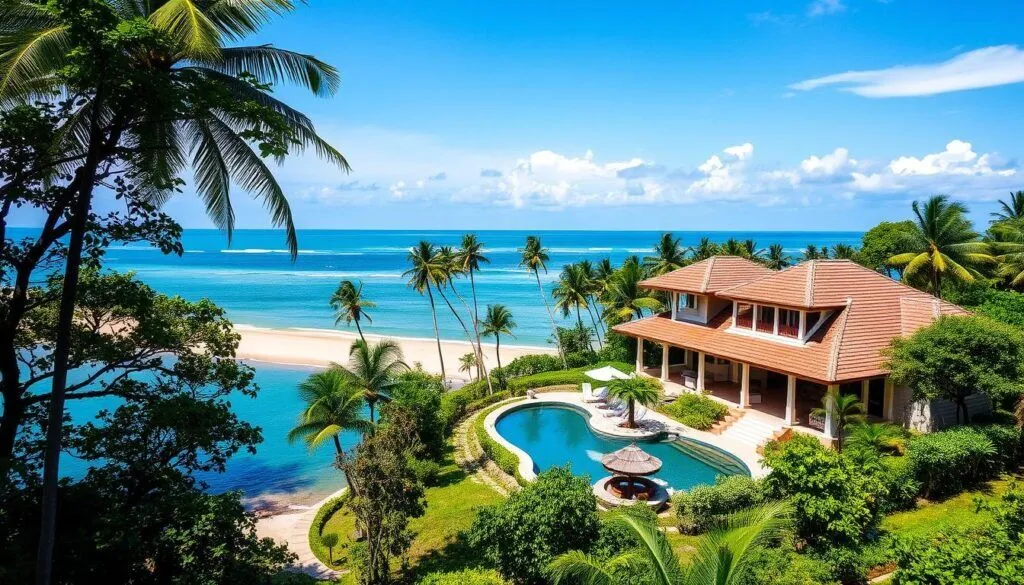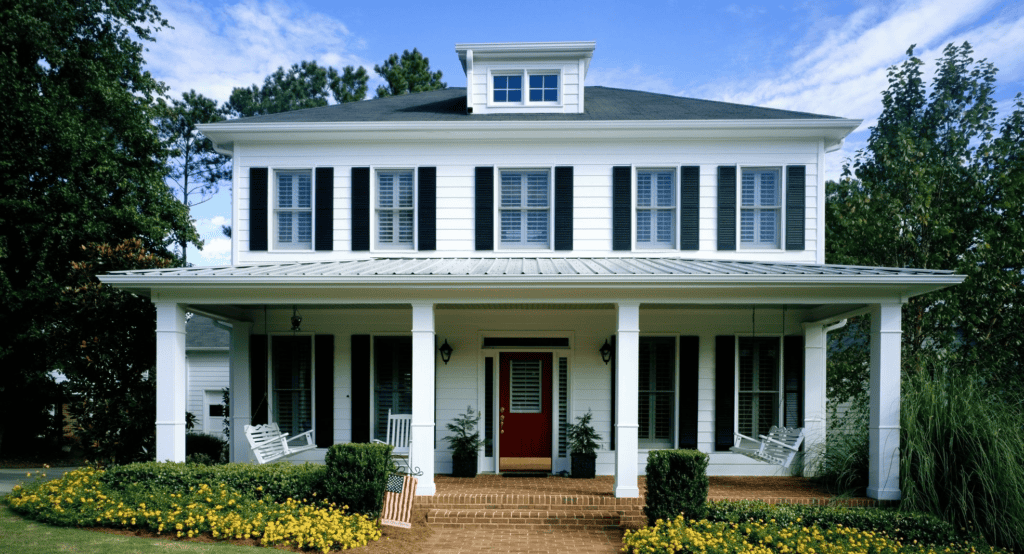Sri Lanka is a tropical island nation in South Asia, located in the Indian Ocean, just southeast of India. Known for its lively culture and diverse landscapes, Sri Lanka is a famous destination for travelers and investors. The capital city serves as the administrative center, while Colombo is the commercial capital and largest city. The country is approximately 65,610 square kilometers, and its landscape includes various features, from sandy beaches to lush rainforests, scenic mountains, and sprawling tea plantations.
With a population of around 22 million people, Sri Lanka is ethnically diverse. Most of the population are Sinhalese, followed by Tamil and Moor communities. The two official languages are Sinhala and Tamil, though English is widely spoken, particularly in business and tourism. Buddhism is the predominant religion, though there are also significant Hindu, Muslim, and Christian communities.
Sri Lanka’s tropical climate means it has warm weather year-round, with the coastal areas being hot and humid and the central highlands offering a cooler, more temperate atmosphere. The country’s economy has steadily grown, attracting foreign investment and tourists seeking to experience its natural beauty, cultural richness, and warm hospitality.
Sri Lanka’s economy has traditionally been based on agriculture, with tea, rubber, and coconut being key exports. In recent years, the country has diversified its economy into manufacturing, services, and tourism sectors. The country is one of the world’s top tea exporters, a major part of its heritage and global presence.
Can foreigners buy property in Sri Lanka?
Yes, foreigners can buy property in Sri Lanka, but some certain regulations and conditions govern the process. The rules vary depending on the type of property being purchased and whether the foreigner is a resident or non-resident. Here’s a detailed overview of the essential points to consider:
Land Ownership Restrictions
- Foreigners can buy land, but they cannot own land outright in certain circumstances, especially if it exceeds a specified threshold or is agricultural land.
- According to Sri Lankan law, foreign individuals or entities are typically not allowed to purchase agricultural land or land close to national borders or military areas. This is to prevent foreign ownership of strategically important areas.
- However, foreign ownership is permitted in condominium units (apartments) and land development projects, subject to conditions.
Condominium Ownership (Apartments)
Foreigners are allowed to purchase apartments or condominiums in Sri Lanka, but there are conditions on the extent of ownership:
- Foreigners can own up to 100% of a condominium unit in a building over four stories tall (usually in urban areas such as Colombo).
- Foreign ownership of no more than 40% of the units in any one building helps ensure that the majority of residents or owners are Sri Lankan nationals.
- Foreign buyers must follow the condominium regulations the Condominium Management Authority (CMA) sets, and developers typically assist with the legal paperwork.
Company Ownership
Foreign investors can also purchase property by setting up a Sri Lankan company. In this case, the company can be owned by foreigners, but the company’s operations and control must comply with the laws governing foreign investment.
- Foreign ownership in companies is typically limited to 100%, but the company must be engaged in commercial activities that contribute to the local economy.
- A company can then acquire property, subject to the laws applicable to company ownership of land.
Conditions for Non-Resident Foreigners
Non-resident foreigners (those who do not have permanent resident status or citizenship) can also buy property, especially condominium units. However, the following are key requirements and restrictions:
- Investment Minimums: The government requires a minimum investment of USD 200,000 (or an equivalent in another currency) for foreigners to purchase land or property.
- Approval from the Board of Investment (BOI): In some cases, foreign buyers might need approval from the Sri Lanka Board of Investment (BOI). For instance, they might need it when purchasing land in specific zones designated by the BOI for foreign investment or in certain tourist areas.
 Special Zones for Foreign Investment
Special Zones for Foreign Investment
Sri Lanka has created special economic zones and areas attracting foreign investment, such as parts of Colombo, Galle, and South and West. Under specific government development programs, foreigners may be allowed to purchase land in these areas.
Restrictions on Agricultural Land
Foreigners are generally prohibited from owning agricultural land. There are exceptions for foreigners who invest in agricultural ventures under certain conditions, but these are usually linked to large-scale commercial projects or development agreements. It’s important to check if the land being considered is classified as agricultural.
Financing Property Purchases
Foreigners usually need help accessing national bank financing to purchase property, so they must buy with funds from abroad. International remittances for property purchases must be routed through Sri Lankan banks, a requirement for property transactions involving foreign currency.
Taxes and Fees for Foreign Property Buyers
- Stamp Duty: A stamp duty is typically 3% of the property transaction value.
- VAT/GST: If the property is purchased directly from a developer, VAT or GST may apply.
- Capital Gains Tax: When foreigners sell property, they may be subject to capital gains tax, which could be a percentage of the profit.
- Withholding Tax: If foreigners earn income from renting out their property, a withholding tax will be levied on rental income.
Sale and Transfer of Property
Foreigners must comply with all legal procedures and pay relevant taxes or duties when selling property. Moreover, if the property is sold to another foreigner, the 40% foreign ownership rule for condominium buildings may come into play.
Obtaining Residency or Citizenship
- While buying property does not automatically grant residency or citizenship, Sri Lanka has specific immigration schemes that offer long-term residency to foreign investors. For instance:
- Sri Lanka’s Investment Visa Program provides long-term residence for foreigners who invest a great amount in the country, including property. The minimum threshold for this visa is typically around USD 250,000 to USD 500,000.
- Sri Lanka’s Citizenship by Investment Program is another option for foreign nationals to apply for citizenship after making a substantial investment.
 Conclusion
Conclusion
Foreigners can buy property in Sri Lanka but must abide by specific rules that vary depending on the property type and location. Condominiums and apartments are the most accessible property types for foreigners, with some limitations on foreign ownership percentages. Agricultural land, however, is off-limits for foreign ownership unless tied to specific development or investment projects. It is highly advisable that foreign investors consult with legal professionals or real estate experts in Sri Lanka to navigate the complexities of property law, taxation, and investment requirements effectively.
Frequently Asked Questions
Which language do people speak in Sri Lanka?
In Sri Lanka, the two official languages are Sinhala and Tamil. Sinhala is spoken by most of the population, primarily by the Sinhalese ethnic group. In contrast, Tamil is spoken by the Tamil ethnic group, particularly in the northern and eastern parts of the island.
Additionally, English is widely spoken and understood, especially in urban areas, in business, education, and government. It is a link language between the different communities and is often used in official documents and communication.
How is the weather in Sri Lanka?
Sri Lanka has a tropical climate with warm temperatures year-round, typically ranging from 26°C to 32°C (79°F to 89°F). The country experiences two monsoon seasons: the Southwest Monsoon (May to September), which brings rain to the southwestern region, and the Northeast Monsoon (December to February), which affects the northeastern areas. From December to March, the dry season is the best time to visit, especially in the northern and eastern parts. Coastal areas are humid and warm, while the central highlands are cooler.
Is real estate expensive in Sri Lanka?
Real estate in Sri Lanka varies in price depending on the location, property type, and demand. Property prices in major cities like Colombo are relatively high, especially for apartments, luxury condos, and commercial spaces. Colombo’s real estate is among the most expensive in the country, reflecting its status as the commercial and economic center, with prices comparable to those in some Southeast Asian cities.
Prices are also on the rise in popular tourist areas (like Galle, Kandy, and beach towns along the southern coast), especially for properties with sea views or proximity to popular attractions. However, rural and inland areas generally have more affordable real estate, with lower prices for land and houses.
Sri Lankan real estate can be expensive in urban and high-demand areas, while rural areas offer more budget-friendly options.












